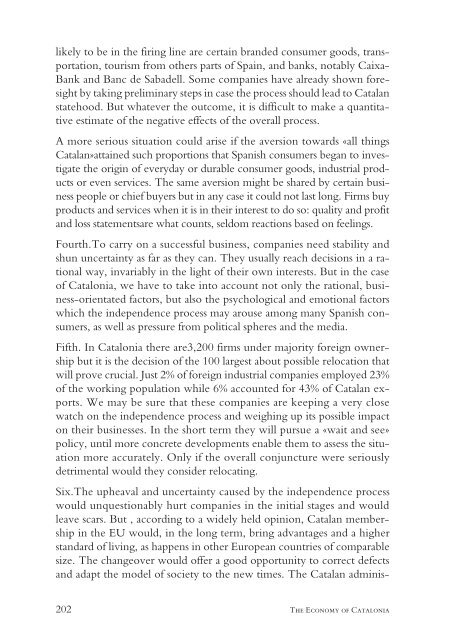The Economy of Catalonia
the_economy_of_catalonia._questions_and_answers_on_the_economic_impact_of_independence
the_economy_of_catalonia._questions_and_answers_on_the_economic_impact_of_independence
You also want an ePaper? Increase the reach of your titles
YUMPU automatically turns print PDFs into web optimized ePapers that Google loves.
likely to be in the firing line are certain branded consumer goods, transportation,<br />
tourism from others parts <strong>of</strong> Spain, and banks, notably Caixa-<br />
Bank and Banc de Sabadell. Some companies have already shown foresight<br />
by taking preliminary steps in case the process should lead to Catalan<br />
statehood. But whatever the outcome, it is difficult to make a quantitative<br />
estimate <strong>of</strong> the negative effects <strong>of</strong> the overall process.<br />
A more serious situation could arise if the aversion towards «all things<br />
Catalan»attained such proportions that Spanish consumers began to investigate<br />
the origin <strong>of</strong> everyday or durable consumer goods, industrial products<br />
or even services. <strong>The</strong> same aversion might be shared by certain business<br />
people or chief buyers but in any case it could not last long. Firms buy<br />
products and services when it is in their interest to do so: quality and pr<strong>of</strong>it<br />
and loss statementsare what counts, seldom reactions based on feelings.<br />
Fourth.To carry on a successful business, companies need stability and<br />
shun uncertainty as far as they can. <strong>The</strong>y usually reach decisions in a rational<br />
way, invariably in the light <strong>of</strong> their own interests. But in the case<br />
<strong>of</strong> <strong>Catalonia</strong>, we have to take into account not only the rational, business-orientated<br />
factors, but also the psychological and emotional factors<br />
which the independence process may arouse among many Spanish consumers,<br />
as well as pressure from political spheres and the media.<br />
Fifth. In <strong>Catalonia</strong> there are3,200 firms under majority foreign ownership<br />
but it is the decision <strong>of</strong> the 100 largest about possible relocation that<br />
will prove crucial. Just 2% <strong>of</strong> foreign industrial companies employed 23%<br />
<strong>of</strong> the working population while 6% accounted for 43% <strong>of</strong> Catalan exports.<br />
We may be sure that these companies are keeping a very close<br />
watch on the independence process and weighing up its possible impact<br />
on their businesses. In the short term they will pursue a «wait and see»<br />
policy, until more concrete developments enable them to assess the situation<br />
more accurately. Only if the overall conjuncture were seriously<br />
detrimental would they consider relocating.<br />
Six.<strong>The</strong> upheaval and uncertainty caused by the independence process<br />
would unquestionably hurt companies in the initial stages and would<br />
leave scars. But , according to a widely held opinion, Catalan membership<br />
in the EU would, in the long term, bring advantages and a higher<br />
standard <strong>of</strong> living, as happens in other European countries <strong>of</strong> comparable<br />
size. <strong>The</strong> changeover would <strong>of</strong>fer a good opportunity to correct defects<br />
and adapt the model <strong>of</strong> society to the new times. <strong>The</strong> Catalan adminis-<br />
202 <strong>The</strong> <strong>Economy</strong> <strong>of</strong> <strong>Catalonia</strong>


